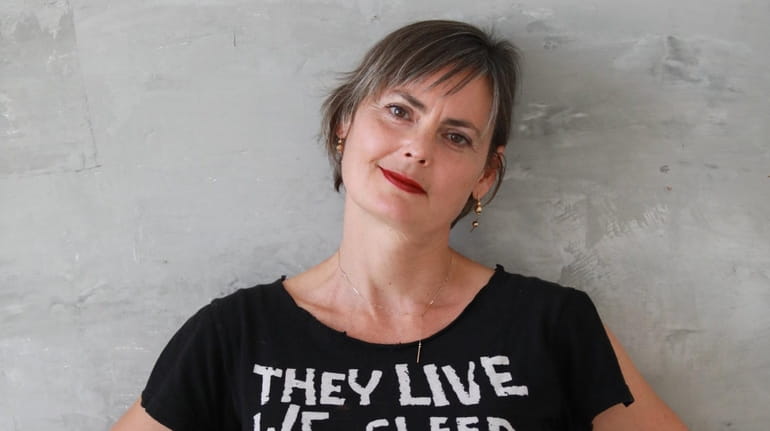Garden City's Sarah Langan talks about her LI-set novel 'Good Neighbors'

Garden City-raised Sarah Langan has set her novel "Good Neighbors" on Long Island. Credit: David Zaugh
Sarah Langan hasn't made her home on Long Island since she grew up in Garden City in the '80s. But her heart, several of her family members and her buzzy new book, the dark satire "Good Neighbors" (Atria, $27), are firmly planted in Nassau County.
Maple Street, the book's primary setting, is fictional but very familiar, while places like Adventureland, the Hempstead Motor Inn, Winthrop Hospital, Croxley's Ale House and many more make cameo appearances.
The Wilde family — mother Gertie, an ex-beauty-pageant queen; father Arlo, a retired rock star and ex-junkie; and kids Julia and Larry — move from Brooklyn to Maple Street in the year 2027. Gertie is "the one to insist on Long Island. She'd had this idea that they'd be like undercover agents, learning the life secrets of the suburban middle class. They'd develop habits like them, and wind up with better jobs like them. … But when they'd got there, it hadn't been like that."
Long Islanders can find out more about "Good Neighbors" when Langan talks to Victor Lavalle in a virtual event hosted by Book Revue in Huntington on Feb. 4 at 7 p.m. We caught up with Langan, who now lives in Los Angeles, to discuss this story of social hierarchy and ihypocrisy, sexual abuse accusations, mob mentality, climate change … and not-so-good neighbors.
Your first three books were in the horror genre; you're a three-time winner of the Bram Stoker award. With Good Neighbors, have you crossed into literary fiction?
While I was writing my third novel, "Audrey's Door," I was pregnant; I went on tour with my newborn. I didn't get back to writing until I had two kids, and I just was not the same person anymore. I was still interested in the same thing — Why is there unkindness? Why do people act the way they do? But as a younger person, my perspective was outrage, which translated to horror. Now I think of it differently. My curiosity outweighs my outrage. Why do people take sides and why does that lead to violence? And why do we not talk to each other in a rational way?
The book opens with an excerpt from a book supposedly published by Hofstra University Press in 2043. It talks about a national obsession with the story, people dressing as the characters for Halloween, a long-running Broadway show called "The Wildes vs. Maple Street." Clippings from books and articles about Maple Street continue through the book. What was your inspiration for that device?
It's a tribute to "Carrie" by Stephen King, who uses a similar technique to give perspective on his characters, to explain to the reader what is going on, and to add a level of quiet social commentary. I love so many of his books but I think "Carrie" is my favorite.
These perspectives from the future help us see that this is much bigger than a couple of suburban moms in a power struggle, and they also drop morsels of information that change our idea of what really happened — who actually died? and how? — which is not clear until the very end.
Another writer who inspires me is Megan Abbott, a real pioneer in the way she uses modern psychology in her books. She has her characters hold back on telling details about where they're coming from, then every third chapter you get a shocking revelation. You're like, Wait a minute. I've been following this person's point of view this whole time, and I didn't know this! Yet she does it so believably that you don't feel it's a cheat. Several of my characters have secrets buried in their pasts that take a while to emerge.
One of the big surprises of the book is that it ends with a quote from the late, great Grace Paley, from her 1974 "Enormous Changes at the Last Minute." "The kids! The kids! Though terrible troubles hang over them … they are still, even now, optimistic, humorous, and brave."
I think it's the goal of every generation to make things a little better for the next one, to make things a little more possible. Gertie and Arlo are like astronauts, they've come so far, and they have raised their children well enough that they're doing better than their parents. Julia and Larry are good people, and that's true for a lot of the kids on the block. Children are the hope of the book. Their sinkholes are not going to be as deep.
WHAT Book Revue presents a virtual discussion with Sarah Langan and Victor Lavalle about "Good Neighbors."
WHEN 7 p.m. Feb. 4
INFO Free; bookrevue.com
